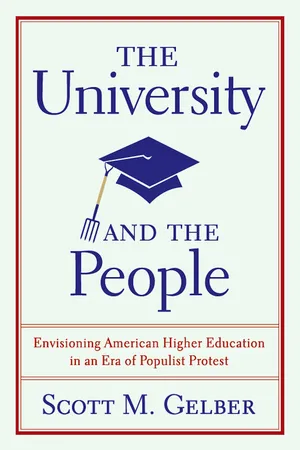
Studies in American Thought and Culture
Envisioning American Higher Education in an Era of Populist Protest
- 264 pages
- English
- PDF
- Only available on web
Studies in American Thought and Culture
Envisioning American Higher Education in an Era of Populist Protest
About This Book
The University and the People chronicles the influence of Populism—a powerful agrarian movement—on public higher education in the late nineteenth century. Revisiting this pivotal era in the history of the American state university, Scott Gelber demonstrates that Populists expressed a surprising degree of enthusiasm for institutions of higher learning. More fundamentally, he argues that the mission of the state university, as we understand it today, evolved from a fractious but productive relationship between public demands and academic authority.
Populists attacked a variety of elites—professionals, executives, scholars—and seemed to confirm academia's fear of anti-intellectual public oversight. The movement's vision of the state university highlighted deep tensions in American attitudes toward meritocracy and expertise. Yet Populists also promoted state-supported higher education, with the aims of educating the sons (and sometimes daughters) of ordinary citizens, blurring status distinctions, and promoting civic engagement. Accessibility, utilitarianism, and public service were the bywords of Populist journalists, legislators, trustees, and sympathetic professors. These "academic populists" encouraged state universities to reckon with egalitarian perspectives on admissions, financial aid, curricula, and research. And despite their critiques of college "ivory towers, " Populists supported the humanities and social sciences, tolerated a degree of ideological dissent, and lobbied for record-breaking appropriations for state institutions.
Frequently asked questions
Information
Table of contents
- Contents
- List of Illustrations
- Acknowledgments
- Introduction: Academic Populism
- 1. Preludes to Populism: Anti-Elitism and Higher Education, 1820–1885
- 2. Scaling the Gilded Halls of the University: Populism and Campus Politics
- 3. The Greatest Good for the Greatest Number: Populism and Academic Access
- 4. Looking Forward: Populism and Economic Access
- 5. Producers and Parasites: The Populist Vision of College Curriculum
- 6. The Tastes of the Multitude: Populism, Expertise, and Academic Freedom
- 7. Watchdogs of the Treasury: Populism and Public Funding for Higher Education
- Conclusion
- Notes
- Index